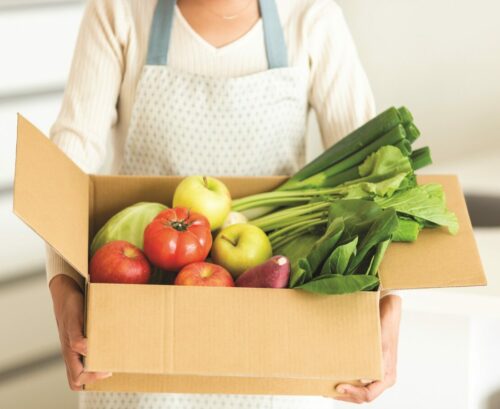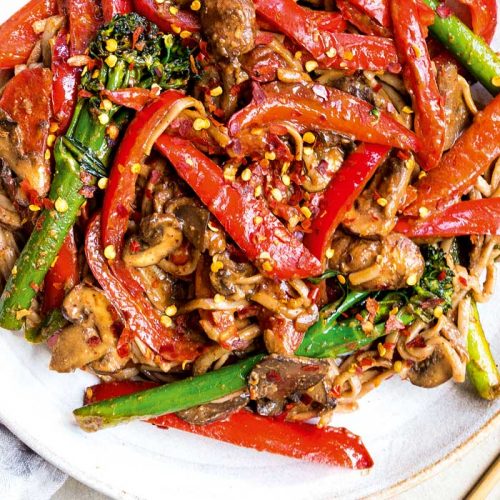
Is a vegetarian diet a healthy way of eating? Nutritionist Rose Carr looks at the benefits, risks and possible pitfalls.
A well-planned vegetarian or vegan diet can be healthy for anyone at any age or stage, even for pregnant and breastfeeding women or athletes. But — and it is a significant but — getting all the nutrients we need on a vegetarian or vegan diet needs careful planning.
Healthy vegetarian diets are usually rich in carbohydrates, dietary fibre, carotenoids, folic acid, vitamin C, vitamin E and magnesium, and low in saturated fat. The not-so-good news is they can also be low in protein, long-chain omega-3 fats, vitamin B12, iron and zinc. Vegans are at particular risk of low intakes of vitamin B12 and calcium.
What is a vegetarian?
The definition of a vegetarian diet has evolved to suit individual preferences. It can include:
- Vegan excludes all meat, poultry, fish, shellfish, eggs, milk and other dairy products, as well as any by-products of animals, such as foods which contain gelatine or rennet.
- Lacto vegetarian includes milk and other dairy products (but don’t eat eggs).
- Lacto-ovo vegetarian includes dairy products and eggs.
- Flexitarian or flexible vegetarian are relatively new terms to describe a semi-vegetarian approach to eating. The goal is to reduce meat eating and increase plant-based eating. As the name implies this is a more flexible approach with a largely plant-based diet, and the occasional inclusion of meat or poultry.
- Pesci-vegetarian or pescetarian includes fish and seafood, as well as eggs, milk and other dairy products but not poultry or other meats.
What the science says
A recent study found that vegetarians and vegans were less likely to have high blood pressure or type 2 diabetes. The Adventist Health Study 2 (AHS-2) in North America, enrolled around 96,000 Seventh-day Adventists from 2002-2007. Their average age at the start was 57 years and the follow-up was five years later. Within this group, just over half were vegetarian — ranging from vegan to semi-vegetarian — and the others were non-vegetarian. The average BMIs ranged from 24 for vegans through to 28 for non-vegetarians. The vegetarians were 44 per cent less likely to have high blood pressure and the incidence of type 2 diabetes was lowest in the vegans at 2.9 per cent, and highest in the non-vegetarians at 7.6 per cent.
Although previous research has found only limited evidence for a link between vegetarian diets and cancer prevention, initial analysis from this study has found there may be moderate reductions in the rates of certain cancers with a vegetarian diet. At this stage, there is only limited cancer data from the AHS-2, so we can expect more to come on this.
Researchers stress that the AHS-2 is an observational study and can only show an association between factors: it can’t prove that a vegetarian diet is the cause of these better health markers. It may be that some health improvements are simply linked with higher intakes of plant food, rather than the actual avoidance of meat or other animal products. Features of the vegetarian diet that are likely to reduce chronic disease include lower intakes of saturated fat and higher intakes of vegetables, fruits, whole grains, legumes, nuts and soy products that include heart-healthy nutrients, such as fibre and phytochemicals.
In fact, other research tells us that both vegetarian diets and prudent diets, which include small amounts of red meat, are associated with reduced risk of diseases, particularly heart disease and type 2 diabetes. So if going fully vegetarian is not for you, the flexitarian approach is still beneficial, and it may be easier to meet all your nutrient needs in this way (see Nutrient alert, below).
Why do people decide to become vegetarian?
Animal welfare
Many people become vegetarian as a result of ethical concerns for animal welfare, such as chickens and pigs kept in cages or pens.
Environmental concerns
The global population — currently over seven billion people — is predicted to grow to around nine billion by 2050. Studies suggest the world will need 70-100 per cent more food to feed this population. On a global scale, producing animal protein uses more resources and more land than plant protein, and so is seen as less sustainable.
Health
This is often a driving force to make a change to a vegetarian way of eating, and there appears to be plenty of research supporting vegetarianism as a healthy way to go.
Cost
Money can be a factor as animal protein is more expensive than plant protein.
Religion
Many faiths, such as Hinduism and Seventh-day Adventism discourage eating meat and animal products.
My teenager’s turned vegetarian! What to do?
Most of us could do with upping our intake of veges and legumes in our diets, so let’s see this as a positive.
There’s no doubt that having just one vegetarian in the family can pose problems when it comes to meal times; sharing meals is a really important part of social development for young people. Often we plan meals with meat at the centre and add to that. To avoid making extra work for ourselves, the newfound vegetarian may be a good spur to increase our attention on vegetables and legumes. With meat as a simple side dish to those, there’ll be more in common with what everyone at the table is eating.
If we’ve been hesitant to experiment with non-meat protein sources, now’s a good time to start. It’s also time to get your teenager involved in meal preparation for the whole family.
Guide to a balanced vegetarian diet
Include lots of variety for maximum nutrients.
Grains
Include wholegrain rice and pasta, quinoa, couscous, bulgar wheat, grainy bread, noodles, cereal or oats. Aim for four or more serves a day, depending on energy requirements, where a serve is 1/2 to 3/4 cup of cooked grains, or one slice of bread.
Vegetables
Include raw and cooked vegetables with lots of variety of colour. Aim for at least five serves where a serve is 1/2 cup of dense veges such as carrots or beans, and one cup for leafy veges such as rocket.
Fruit
Two pieces a day.
Protein
Aim for at least two serves each day where a serve is: 3/4 cup cooked legumes; 1/3 cup nuts or seeds; 3/4 cup or 200g tofu or tempeh; 1 egg.
Calcium sources
Aim for two-three serves of calcium-rich foods each day, where a serve can be: one cup of milk or calcium-fortified soy drink; 40g of cheese; a tub of yoghurt. Otherwise, consider a calcium supplement.
Fats and oils
Include seed or nut oils, nut butters, seeds, avocado.
Nutrient alert
Vegetarians need to pay special attention to make sure they get enough of these nutrients:
Iron
Essential for oxygen transport throughout the body, around one-third of young women have inadequate intakes of this mineral, and vegetarian women are at even greater risk. Iron from plant foods is not as readily absorbed as the haem iron in meat, so even more is needed in a vegetarian diet. Include iron-fortified breakfast cereals, plenty of dark green vegetables, legumes, tofu, nuts and seeds. Increase iron absorption by adding foods with vitamin C (such as capsicum, tomato or kiwifruit) with grains or vegetables, and avoid drinking tea at meal times.
Zinc
Important for immunity, meat is a rich source of zinc. Vegetarian sources of zinc include wholemeal and grainy breads, bran and wholegrain breakfast cereals, legumes and nuts.
Calcium
Essential for healthy bones, milk and other dairy foods are our best source of calcium as they contain high amounts of readily available calcium. However, if we avoid dairy it’s important to ensure any soy alternatives we use are calcium-fortified. Other sources include calcium-set tofu (check the label), fortified cereals, leafy greens, broccoli, beans, almond and tahini, although these are all significantly lower in calcium than dairy products.
Vitamin B12
Needed to form red blood cells and maintain a healthy nervous system, this vitamin is only found in animal products, or in some fortified foods such as Marmite. Vegans are likely to need a supplement. Milk and dairy products are a good source for vegetarians.
Omega-3
Vegetarian sources of essential omega-3 fats include dark green leafy vegetables, nuts and seeds, and oils (such as soybean, canola, flaxseed and walnut oils).
Getting enough protein
Unlike carbohydrates and fat, our bodies don’t store much protein, so it’s vital to ensure we get enough every day. Protein also helps us feel full. Most plant-based proteins are described as incomplete proteins, as they lack one or more of the essential amino acids our bodies can’t make themselves. So it’s important for vegetarians, especially those excluding dairy and eggs, to include a variety of protein sources throughout the day to get all the essential amino acids.
Complete vegetarian protein sources
Eggs, dairy products, soy beans/edamame, tofu, tempeh and Quorn. Note that Quorn products are not vegan as they contain a small amount of egg white and can contain small amounts of milk protein.
Incomplete protein sources
Legumes, such as lentils, beans and chickpeas; nuts and seeds; and grains such as quinoa, bulgar wheat, pasta and bread. Combine incomplete sources to make complete protein, such as baked beans and toast, rice and beans, quinoa salad topped with seeds, or hummus and bread.
Article sources and references
- Academy of Nutrition and Dietetics www.eatright.orghttps://www.eatright.org/
- American Dietetic Association. 2009. Position of the American Dietetic Association: vegetarian diets. Journal of the American Dietetic Association 109:1266-82https://www.ncbi.nlm.nih.gov/pubmed/19562864
- Fox N & Ward K. 2008. Health, ethics and environment: a qualitative study of vegetarian motivations. Appetite 50:42-9https://www.ncbi.nlm.nih.gov/pubmed/17980457
- Pribis P et al. 2010. Beliefs and attitudes toward vegetarian lifestyle across generations. Nutrients 2:523-31https://www.ncbi.nlm.nih.gov/pubmed/22254039
- McEvoy CT et al. 2012. Vegetarian diets, low-meat diets and health: a review. Public Health Nutrition: 15:2287-94https://www.ncbi.nlm.nih.gov/pubmed/22717188
- Godfray HC et al. 2010. Food Security: the challenge of feeding 9 billion people. Science 327:812https://science.sciencemag.org/content/327/5967/812
- Orlich MJ et al 2013. Vegetarian dietary patterns and mortality in Adventist Health Study 2. JAMA Internal Medicine 173:1230-38https://www.ncbi.nlm.nih.gov/pubmed/23836264
- Orlich MJ & Fraser GE. 2014. Vegetarian diets in the Adventist Health Study 2: a review of initial published findings. American Journal of Clinical Nutrition 100:S353-8https://www.ncbi.nlm.nih.gov/pubmed/24898223
- Tantamango-Bartley Y et al. 2013. Vegetarian diets and the incidence of cancer in a low-risk population. Cancer Epidemiology, Biomarkers and Prevention 22:286-94https://www.ncbi.nlm.nih.gov/pubmed/23169929
- Evensen H. 2014. The ethics of eating animals http://green.harvard.edu/news/ethics-eating-animalshttps://green.harvard.edu/news/ethics-eating-animals
- Key TJ et al. 2006. Health effects of vegetarian and vegan diets. Proceedings of the Nutrition Society 65:35-4https://www.ncbi.nlm.nih.gov/pubmed/16441942
- Ministry of Health. 2012. Eating for Healthy vegetarians. www.healthed.govt.nzhttps://www.healthed.govt.nz/
www.healthyfood.com










